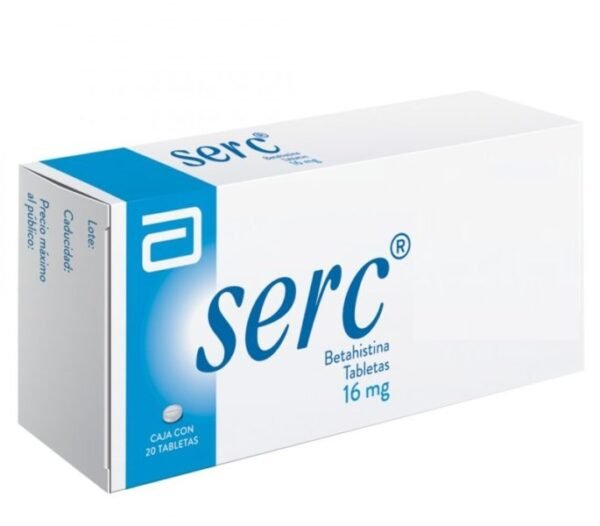Betahistine is a medication primarily used to treat vertigo and Ménière's disease. Vertigo is characterized by a sensation of spinning or dizziness, often accompanied by nausea and balance issues. Ménière's disease is a disorder of the inner ear that can cause episodes of vertigo, hearing loss, tinnitus (ringing in the ears), and a feeling of fullness or pressure in the ear.
Betahistine works by improving blood flow in the inner ear, which helps to reduce the pressure buildup and fluid imbalances thought to contribute to vertigo and Ménière's disease symptoms. It's generally well-tolerated, but like any medication, it can have side effects, such as headache, stomach upset, and drowsiness.
Betahistine increases cochlear blood flow, excites neurons in the cortex and subcortical structures, and suppresses the vestibular sensory input.
It is used to reduce the episodes of vertigo in patients with Ménière disease.
It is also used to treat vertigo associated with benign positional vertigo and vertebrobasilar insufficiency.
Betahistine doses in Adults
Betahistine dose in the treatment of Ménière disease (for vertigo):
- Usually recommend dose is 8 to 16 milligrams of betahistine by mouth three times a day, or 24 milligrams twice a day, to reduce the number of vertigo episodes.
- The typical range for daily dosage is between 24 to 48 milligrams, spread out over the day.
- In some rare and severe cases where the usual doses don't work, doctors may slowly increase the dosage up to 480 milligrams daily, but this is not common and is considered off-label use.
Betahistine doses in Children
Safety and efficacy not established.
Pregnancy Risk Factor: C
- In studies done on animals, some negative effects were noticed during pregnancy.
Betahistine use during breastfeeding:
- It's unclear whether betahistine passes into breast milk.
- The manufacturer advises considering factors like the potential exposure of the infant to the medication, the advantages of breastfeeding for the baby, and the benefits of the treatment for the mother when deciding whether to continue or stop breastfeeding while using this medication.
Betahistine doses in renal disease:
- The manufacturer's instructions do not include specific dosage adjustments for people with kidney problems because this hasn't been studied.
- However, it's important to be cautious when using betahistine if you have kidney issues.
Betahistine doses in Liver Disease:
- The manufacturer's instructions do not include specific dosage adjustments because betahistine is mainly processed by the liver, but this hasn't been thoroughly studied.
- Therefore, it's recommended to use betahistine with caution.
Common Side Effects of Betahistine Include:
- Central nervous system:
- Headache
- Gastrointestinal:
- Nausea
- Dyspepsia
Frequency not defined:
- Central nervous system:
- Confusion
- Convulsions
- Drowsiness
- Hallucination
- Paraesthesia
- Cardiovascular:
- Hypotension
- Tachycardia
- Ventricular premature contractions
- Dermatologic:
- Pruritus
- Skin rash
- Stevens-Johnson syndrome
- Urticaria
- Gastrointestinal:
- Abdominal Distension
- Abdominal Pain
- Bloating
- Peptic Ulcer
- Vomiting
- Hypersensitivity:
- Anaphylaxis
- Angioedema
- Hypersensitivity Reaction
- Respiratory:
- Dyspnea
Contraindications to Betahistine Include:
- Betahistine should not be used if you have a known allergy to it or any of the ingredients in the medication.
- It's also not recommended if you have or have had an active peptic ulcer disease (ulcers in the stomach or small intestine), or if you have a condition called pheochromocytoma, which is a rare tumor of the adrenal glands that can cause high blood pressure and other symptoms.
Warnings and Precautions
Asthma
- If you have asthma, it's important to use betahistine with caution.
- Some asthmatic patients have reported clinical intolerance to the medication.
Cardiovascular disease
- For individuals with cardiovascular disease, it's important to approach betahistine use cautiously.
- There have been reported cases, following its introduction to the market, of adverse cardiovascular effects such as ventricular extrasystoles (irregular heartbeats), hypotension (low blood pressure), and tachycardia (rapid heart rate) associated with betahistine usage.
Hepatic impairment
- If you have hepatic impairment (liver problems), it's important to use betahistine with caution. This medication is mainly processed by the liver, so having liver issues could affect how your body handles it.
Peptic ulcer:
- In individuals with a history of peptic ulcer, betahistine use should be avoided.
- This medication has been associated with the worsening of symptoms in patients with a history of peptic ulcer, and therefore, it's contraindicated in those with existing or past peptic ulcers.
Betahistine (United States: Not available): Drug Interaction
|
Risk Factor C (Monitor therapy) |
|
|
Antihistamines |
May diminish the therapeutic effect of Betahistine. |
|
Beta2-Agonists |
Betahistine may diminish the therapeutic effect of Beta2-Agonists. |
|
Monoamine Oxidase Inhibitors |
May increase the serum concentration of Betahistine. |
How to take Betahistine (Serc)?
- Betahistine can be taken with or without meals.
- If you experience any gastrointestinal (GI) side effects, such as stomach upset or nausea, taking it with meals may help alleviate these symptoms.
Mechanism of action of Betahistine:
- Betahistine works in a unique way by acting as a partial agonist of histamine at the H1 receptor and as an antagonist at the H3 receptor.
- It's not very active at the H2 receptor.
- Animal studies suggest that betahistine may have several effects in the body: it could increase blood flow in the cochlea (part of the inner ear), stimulate neuronal activity in certain brain areas, decrease sensory input from the vestibular system (which helps with balance and spatial orientation), and increase the synthesis and release of histamine from the hypothalamus.
- These effects are thought to be due to its actions on histamine receptors in different parts of the body.
Absorption:
- Betahistine is absorbed quickly and completely by the body.
- Food can delay its absorption, with peak levels of its inactive metabolite reached around 1 hour after ingestion.
Protein Binding:
- Less than 5% of betahistine binds to proteins in the body.
Metabolism:
- Betahistine undergoes rapid and almost complete metabolism in the liver.
- It is metabolized into an inactive metabolite called 2-pyridylacetic acid.
Half-life Elimination:
- The half-life of elimination for the inactive metabolite is approximately 3.5 hours.
Excretion:
- Betahistine and its inactive metabolite are primarily excreted through urine, accounting for about 91% of elimination.
Betahistine International brands:
- ACT Betahistine
- Auro-Betahistine
- PMS-Betahistine
- Serc
- TEVA-Betahistine
- Acuver
- Aequamen
- Agihistine
- Agiserc
- Alfinor
- Alvigo
- Avertid
- Be-Stedy
- Beanorm
- Beautipex
- Behistin
- Bertigo
- Besutin
- Betagen
- Betagis
- Betahist
- Betahistine-Eurogenerics
- Betasaerc
- Betaserc
- Betastin
- Betavert
- Betistin
- Betris
- By-Vertin
- Clensan
- Ergo
- Exigo
- Fidium
- Histigo
- Histine
- Kernhistine
- Kurtigo
- Lectil
- Lobione
- Menaril
- Meniace
- Menistin
- Merislon
- Merison
- Meristin
- Mertigo
- Meslon
- Microserc
- Misoserc
- Nisulin
- Novertin
- Nuveat
- Rotaver
- Seniere
- Serc
- Stei
- Suzutolon
- Theohist
- Tiniril
- Urutal
- Vasomotal
- Vasoserc Forte
- Vasotal
- Verdiz
- Vergo
- Vert
- Vertigal
- Vertigon
- Vertihof
- Vertikind
- Vertimed
- Vertin
- Vertinex
- Verum
- Vestibo
- Veszrc
Betahistine Brands in Pakistan:
|
Betahistine (HCL) [Tabs 8 Mg] |
|
|
Betaride |
Vertex Pharma |
|
D-Vert |
Remington Pharmaceutical Industries (Pvt) Ltd. |
|
Deperin |
Focous & Rulz Pharmaceuticals |
|
Enier |
Sami Pharmaceuticals (Pvt) Ltd. |
|
Hibet |
Alina Combine Pharmaceuticals (Pvt) Ltd. |
|
Hiserk |
Nimrall Laboratories |
|
Histogen |
Genome Pharmaceuticals (Pvt) Ltd |
|
Microser |
Searle Pakistan (Pvt.) Ltd. |
|
Serc |
Abbott Laboratories (Pakistan) Limited. |
|
Seso |
Getz Pharma Pakistan (Pvt) Ltd. |
|
Vergo |
Genetics Pharmaceuticals |
|
Vertin |
Remington Pharmaceutical Industries (Pvt) Ltd. |
|
Vetinil |
Standpharm Pakistan (Pvt) Ltd. |
|
Betahistine (HCL) [Tabs 16 Mg] |
|
|
Betaride |
Vertex Pharma |
|
D-Vert |
Remington Pharmaceutical Industries (Pvt) Ltd. |
|
Deperin |
Focous & Rulz Pharmaceuticals |
|
Deperin |
Focous & Rulz Pharmaceuticals |
|
Enier |
Sami Pharmaceuticals (Pvt) Ltd. |
|
Hiserk |
Nimrall Laboratories |
|
Histogen |
Genome Pharmaceuticals (Pvt) Ltd |
|
Serc |
Abbott Laboratories (Pakistan) Limited. |
|
Seso |
Getz Pharma Pakistan (Pvt) Ltd. |
|
Vergo |
Genetics Pharmaceuticals |
|
Vertin |
Remington Pharmaceutical Industries (Pvt) Ltd. |
|
Vetinil |
Standpharm Pakistan (Pvt) Ltd. |
|
Betahistine (HCL) [Tabs 24 Mg] |
|
|
D-Vert |
Remington Pharmaceutical Industries (Pvt) Ltd. |
|
Serc |
Abbott Laboratories (Pakistan) Limited. |
|
Vertin |
Remington Pharmaceutical Industries (Pvt) Ltd. |



 Injection.webp)
.webp)